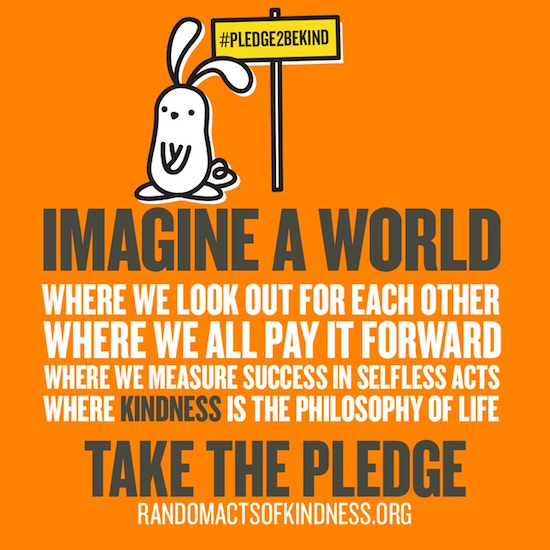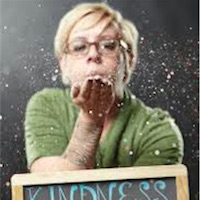
Anxiety. Depression. Insomnia.
Three of the most common conditions facing adults in the U.S. today. Unfortunately, they all affect me personally.
Five years ago, when I started my job at The Random Acts of Kindness Foundation, I was on half a dozen different medications to help me manage the above conditions.
As of today, I only take one (occasionally) to help me sleep. It happened gradually, and it wasn’t obvious to me (as I was slowly removing prescriptions from my medicine cabinet) why I was able to eliminate the medications. Looking back I realize the answer was staring me in the face the whole time. The answer was kindness.
As I continued to learn more about how committing acts of kindness lowers blood pressure and increases energy levels, I learned the biology behind it as well. When a person commits an act of kindness, the hormone oxytocin is released which, in turn, releases a chemical called nitric oxide, which dilates blood vessels. Pretty cool, right? There’s more.
Because of my depression and insomnia I had low levels of energy. I just wasn’t interested in participating in many activities. I didn’t want to go out with friends. I was tired all day at work and exhausted by the time I got home. When I started making an effort to be nicer in small interactions, like smiling at people passing by or making a point of stopping and saying “hello” to the security guard in our office, I felt a rush of joy.
When I went out of my way to help someone, I felt even better. It wasn’t major stuff. I helped an elderly woman cross the street, as I could tell she wasn’t going to make it before the traffic light turned. I visited a friend who was going through a really tough time, even though I knew I needed to be home to help my daughter with her homework. This rush of joy is due to the “helper’s high” where our brain’s pleasure and reward centers light up as if we are the recipient of a good deed.
I remember a day when our entire staff stood on a street corner and held up big signs with positive messages for people driving by. One sign simply said, “You’re Awesome.” Another read, “Have an Awesome Day.” My favorite, said, “Honk if You Love Someone.” I felt so good while we were doing it, and that feeling stayed with me for days afterwards. What I came to find out was that in moments like this the body produces more serotonin. This is the “feel good” chemical that makes us happy. And it can last a long time. In fact, people who do good for others on a regular basis are happier overall and tend to experience fewer maladies causing them to be more likely to live longer.
Whoa. What? Not only will I feel better and take fewer medications, but I’ll also live longer??
Okay, I’m in.
Over time, I found that I was addicted to doing good. Not just because of my job, but because I was seeing health benefits I couldn’t replicate through medication. I couldn’t believe how years of struggling with mental illness and working with my doctors to find the right combination of medications wasn’t working for me. What was working was my intentional efforts to be kinder to other people and therefore kinder to myself. I saw that my actions were affecting my family and friends as well. People who witness an act of kindness have a significantly improved mood and are more likely to pay it forward, just because they saw me do it. Read that again. Just by watching someone do something nice, you are potentially benefiting your own health.
It didn’t happen overnight. On the contrary, it happened over a few years. I wonder: If I had spent more time focusing on intentionally being kind (in a much more concerted effort) early on, would I have felt better and thrown those medications out a long time ago? When I look at the body of evidence out there, I believe so.
The good news is that we all have the opportunity to amp up our kindness efforts this month! #RAKWeek is starting on Valentine’s Day 2016. Please sign our #Pledge2BeKind and share your stories with us. Together we can spread kindness—and health—far and wide!
# # #
Author: Brooke Jones
Editor: Travis May
Photo: Courtesy of Author






Read 1 comment and reply